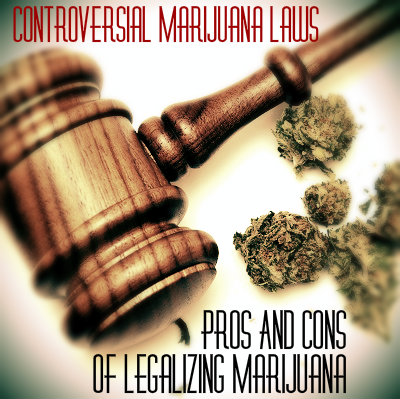08 Oct 2014
Controversial Marijuana Laws
Americans have long debated legal recreational marijuana pros and cons, as well as the positives and negatives of medical marijuana. Never has the debate been more heated than now, when controversial laws have been passed in a number of states. More than 20 states have passed laws legalizing medical marijuana, or cannabis, while two states now allow legal recreational use of the drug.
Pros And Cons Of Legalizing Marijuana
Many people can see both sides of the issue, but it remains one that is highly controversial.
The Pros Of Recreational Marijuana
Last year, two states voted to legalize recreational marijuana: Washington and Colorado. More people in these states supported the legalization than were against it, and yet it remains highly controversial. Supporters of recreational cannabis being legal have several reasons they see the recent laws as positive.
Perhaps the biggest reason is that the states will have a new source of tax revenue. The idea is that state governments, many of which have big fiscal deficits, can regulate and heavily tax the legal pot sales. Other reasons supporters cite for legalizing the drug include greater freedoms for law-abiding citizens and a more modern attitude toward pot.
The Cons Of Decriminalizing Cannabis
Not everything about making marijuana legal for recreational use is positive. Critics have plenty to say about the new laws, probably more than the supporters. Legal marijuana poses a number of issues. The first is safety for individuals. Marijuana is a drug; it causes side effects and impairs judgment. It is also addictive and can lead to a lifelong dependence, especially with frequent use.
Legal marijuana is also a problem of public health. While individuals may now have the right to choose to use the drug, the rest of us are not able to choose not to be impacted. The most obvious risk is the possibility of impaired driving. Drunk drivers cause thousands of accidents, injuries and deaths every year. High drivers stand to cause even more.
Finally, there is the issue of the impact of legal marijuana on young people. Of all the cons for legalizing marijuana, this may be the most troubling. Although its use is to be restricted to adults, legal marijuana means that young people will inevitably have greater access to the drug. Currently, alcohol is the substance most abused by teens. This can be attributed to its legal status and ready availability. If every state legalizes pot, you can expect teens will get access to marijuana as well. The drug can cause long-term problems in young users including impaired memory and cognitive functioning.
Legalized marijuana will likely remain a controversial topic of debate throughout the country. Although two states have allowed recreational use of the drug for adults, the possible negative consequences of these moves are great. Exactly how the drug will start to effect young people and public health remains to be seen.
Much of the current drug news from around the country focuses on heroin and narcotic painkillers. Methamphetamine is sometimes thought of as yesterday’s news, but in many areas it is still a raging problem. In 2013, news outlets reported that Tennessee had become the leading state in the U.S. for meth use. Now a new law has gone into effect that legislators and law enforcement officials hope will crack down on the epidemic in Tennessee that is costing taxpayers $1 billion a year.
The Meth Problem
It was more than a decade ago that meth labs started springing up around the country, but particularly in rural areas. Methamphetamine is a controlled substance that can be prescribed by a doctor, but rarely is. The side effects and the potential for abuse are so great that it is a last-resort medication for some medical conditions, including ADHD and obesity.
Effects Of Meth
Meth is susceptible to abuse because it is a stimulant and gives the user energy as well as a euphoric feeling. On the downside, meth can cause:
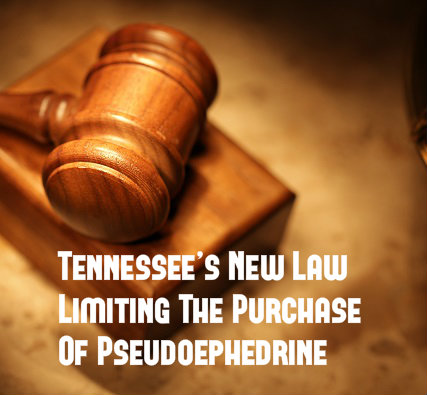 high blood pressure
high blood pressure- an elevated body temperature
- dry mouth
- jaw-clenching
- memory loss
- aggression
- paranoia
- anxiety
- insomnia
- brain damage
- organ damage
- severe dental problems
- violent behavior
It is also highly addictive and with prolonged and continued use, the negative side effects increase.
Meth has become such a huge problem because it is relatively easy to make. With just a few ingredients, including an over-the-counter cough medicine ingredient, anyone can make it in a home lab. These labs are abundant in Tennessee and the drug has been having disastrous effects on individuals and families in the state.
How Tennessee’s New Law Is Limiting The Purchase Of Pseudoephedrine
While other states have enacted and enforced strict laws regarding the purchase of cough medicine that have helped cut down on meth manufacturing and use, Tennessee has fallen behind. A bill passed in April can now change the course of Tennessee’s meth trajectory. The new law restricts the purchase of medicines containing pseudoephedrine, the cough medicine ingredient for making meth, to 48 tablets per month and 240 per year. The cap previously sat at 75 tablets per month. Some lawmakers wanted to slash that maximum even further, but a compromise was set at 48.
It may seem like a no-brainer to restrict pseudoephedrine, but there are plenty of law-abiding Tennesseans who depend on the medication for allergy relief. Some opponents of the bill argued that it was unfair to restrict access to the medication and stated that most of the meth used in Tennessee comes from other states. Still, the majority of lawmakers agreed that slashing the maximum allowance would curb meth use in the state.
As part of the restriction on buying pseudoephedrine, consumers’ purchases of the medication will be tracked. Those with a real medical need for more pseudoephedrine will be able to go over the limit with a doctor’s prescription. The need for more restrictions on meth-making ingredients is great and many feel that this new law meets that need. Others are skeptical, but only time will tell if Tennesseans are really ready to kick the meth habit.
Read Other News In Addiction And Addiction Rehab
19 Sep 2014
Speaking Up About Addiction
Addiction is often a silent disease. While no one is ashamed to talk about having arthritis or high blood pressure, the disease of addiction has long carried a terrible stigma. Those struggling with addiction are too often looked upon, by others as well as themselves, as weak, morally inferior and lacking in willpower. It is difficult to speak up and speak out about the challenges of this disease, but when we do, we can make real, positive changes. Only with awareness and recognition will more addicts get the help they need, while future addictions are prevented.
The Power Of Awareness
 The expression goes that knowledge is power and it carries a great amount of truth. When something like addiction remains shadowed and hidden, ignorance is allowed to grow. When someone knows nothing about addiction, the lies and misinformation seep in along with assumptions and prejudices. Someone who is ignorant about addiction may not be aware that a friend, coworker, or even a family member is struggling with the disease.
The expression goes that knowledge is power and it carries a great amount of truth. When something like addiction remains shadowed and hidden, ignorance is allowed to grow. When someone knows nothing about addiction, the lies and misinformation seep in along with assumptions and prejudices. Someone who is ignorant about addiction may not be aware that a friend, coworker, or even a family member is struggling with the disease.
Raising awareness about addiction can be powerful. Spreading the word about how damaging this disease can be is a great way to prevent people from abusing substances in the first place. Prevention is the best way to help spare people from the pain and suffering caused by addiction. Raising awareness can even help motivate other people to help make a difference. Even for those who never had an interest in drug use or drinking, learning more about addiction can inspire anyone to get involved with helping others.
Awareness can also make big changes over the long term. It might feel as if one person, or one small group, speaking up and talking about addiction makes little difference. The truth is that it can have a snowball effect. Your efforts to reach others inspire the next person, and the next person. When enough people start speaking up, lawmakers start to listen, as do organizations with the means to fund research and treatment. The act of speaking up, even by one person, can be powerful.
Sharing Stories Of Addiction
If you have been impacted by addiction, whether your own or someone else’s, sharing that story is one important way to speak out and raise awareness. The more we speak about addiction and the more we hear about it, the more it loses its mystery and stigma.
Several organizations encourage and host events that allow you to get your story out there:
- The National Council on Alcoholism and Drug Dependence has named September National Alcohol and Drug Addiction Recovery Month. This event encourages people to learn about addiction and recovery as well as treatment options.
- The Substance Abuse and Mental Health Services Administration supports October as National Substance Abuse Prevention Month and provides ideas and events for people to share their stories and to learn more about addiction.
- The U.S. Army supports veterans battling drug addiction by encouraging everyone to learn more about addiction, treatment and recovery. It also advocates for celebrating the successes of those who are in recovery and sober.
When it comes to a disease laden with stigma, the only way to banish the shame and ignorance is to speak up. If you have battled addiction, if you have seen a loved one laid low by this disease, or if you simply care about the issue, speak up, spread awareness and help others learn more about the disease of addiction!
Read Our Other Empowering And Inspirational Posts
Overcoming Addiction Is Worth It & So Are You! – Let Us Help You Take That First Step – Call Us Now!
26 Aug 2014
How Changing Marijuana Laws May Impact Children
Changing attitudes toward marijuana in society have led directly to voters changing laws in municipalities and across entire states. Nearly half of all states allow the use of marijuana for medical purposes and two allow adults to use it recreationally, even while the federal government still outlaws the drug entirely. Many people see the benefits of allowing more use of the drug (e.g., helping people with certain medical issues and increasing state revenues). Others are more worried about the unforeseen consequences, such as how greater access to marijuana will affect children.
Kids Mimic Adult Attitudes Toward Marijuana
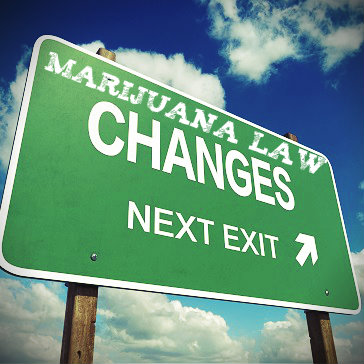 The changes in laws regarding the use of marijuana run parallel to the shift in the public’s general attitude toward this drug. Many supporters of marijuana legalization cite statistics and research that show how much safer the drug is than alcohol, a legal substance. Legalizing marijuana could make this less harmful substance as acceptable as alcohol. Many people see this as positive because it would provide tax revenue for state governments.
The changes in laws regarding the use of marijuana run parallel to the shift in the public’s general attitude toward this drug. Many supporters of marijuana legalization cite statistics and research that show how much safer the drug is than alcohol, a legal substance. Legalizing marijuana could make this less harmful substance as acceptable as alcohol. Many people see this as positive because it would provide tax revenue for state governments.
When you consider how children absorb the attitudes of the adults around them, you can understand how destructive legalized marijuana could be for young people. Most would agree that children and teens shouldn’t be allowed access to marijuana, but by sensing the lax attitude toward the drug that many adults have, young people will not take the risks of using marijuana seriously.
Alcohol, for instance, is legal for adults and considered to be socially acceptable among most people. As a result, teens use it too. Nearly half of all high school students drink, despite the negative consequences the behavior could produce. As adult attitudes toward marijuana shift to include social acceptance, you can expect teens to follow suit and begin to use the drug more often. As with alcohol, smoking marijuana is bad for teens. It affects the still-developing brain and can cause mental health issues as well as addiction.
Kids Poisoned By Marijuana
Laws giving adults greater access to marijuana mean children come into contact with the drug more than ever before. Because of this there has already been an increase in accidental ingestion by kids. Researchers found that there was a spike in visits to emergency rooms after states legalized medical marijuana and the federal government stated that it would not prosecute anyone with respect to its use for medical purposes.
One of the most common ways in which kids accidentally take in marijuana is through foods and drinks containing the drug. Such ingestions can cause children to have hallucinations, to have difficulty breathing, to lose consciousness, and even to die if the amounts are high enough or if the child isn’t treated immediately. What might be most worrisome about accidental poisonings of kids by marijuana is that it is a new phenomenon and doctors are not yet aware of all the possible harm it can cause.
Parental Neglect
Another way in which legalized marijuana, particularly for recreational use, may impact children is how parents getting high will treat their kids. Everyone knows how disruptive, and even abusive, an alcoholic parent can be to children, but what about a parent who gets hooked on using marijuana? Maybe the results would not be as devastating, but a parent who is high is not likely to do his or her job very well. Only time will tell if we see more neglect of children as marijuana use becomes legal.
Whenever laws change with respect to drugs or alcohol it is important to consider how the changes will affect young people. No matter how thoughtfully laws are crafted, or how careful adults and dispensaries are with the drug, children are bound to be impacted by increased access to marijuana.
Check Out More News On Drugs And Addiction
31 Jul 2014
The Downside Of Legalizing Marijuana
When examining the issue of marijuana legalization, pros and cons fill up both sides of the balance sheet. But while there may be some benefits to legalization, it should be noted that benefits of pot legalization do not directly translate to benefits of pot use. While the downsides and dangers of pot use are plentiful, that is a separate issue.
Marijuana – Not Harmless Or Equivalent To Medicine
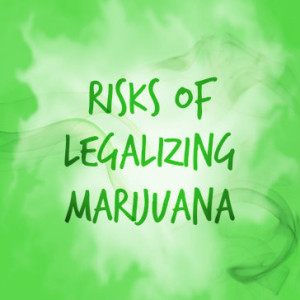 One of the primary cons of marijuana legalization is the mixed message it sends to users and potential users, especially teens. Proponents of marijuana legalization speak of health benefits or cite it as a treatment for chronic pain or for the relief of symptoms associated with chronic illnesses such as cancer, multiple sclerosis and even AIDS. This language takes marijuana out of the realm of “illicit drug” and into the category of “alternative medicine.” If not seen as a substance that promotes health, it will, at least be seen as harmless. Unfortunately marijuana is not harmless, nor is it akin to medicine.
One of the primary cons of marijuana legalization is the mixed message it sends to users and potential users, especially teens. Proponents of marijuana legalization speak of health benefits or cite it as a treatment for chronic pain or for the relief of symptoms associated with chronic illnesses such as cancer, multiple sclerosis and even AIDS. This language takes marijuana out of the realm of “illicit drug” and into the category of “alternative medicine.” If not seen as a substance that promotes health, it will, at least be seen as harmless. Unfortunately marijuana is not harmless, nor is it akin to medicine.
Though marijuana has been legalized in some states for medical use, that does not mean it has been approved by the FDA as a treatment for any sort of medical condition. Nor should it be linked with other non-FDA approved treatments and therapies such as herbal remedies, alternative medicines or vitamins. Regardless of its legal status, marijuana is a drug and it carries with it health risks and consequences. And voting to legalize it actually undermines the authority of the FDA, putting the task of approving drugs and medical treatments into the hands of voters and legislators.
High Risk For Dependence And Health Consequences
Questionable health benefits notwithstanding, people who use marijuana for medical or recreational purposes are building a relationship with a substance that carries a high risk of dependence and addiction. Using marijuana “medically” does not mean that one is exempt from short-term memory loss, that cognitive function is not impaired, that lung tissue is not damaged or that it may not become a gateway drug to more potent and dangerous substances.
Risks Outweigh Suggested “Benefits”
Those who oppose legalization continue to argue that any suggested benefits of marijuana use are far overshadowed by the risks and dangers. Anti-legalization doctors and scientists demonstrate that there are no measurable health benefits of marijuana use. The scientific research does not support the claims and adequate, reliable research has not been conducted. The conditions for which medical marijuana may be useful are broad and vague. Opponents also note that the legal, non-marijuana therapies currently on the market are more effective in treating the conditions for which pot is suggested
The cons of legalizing marijuana are many. Though marijuana may have some suggested (though not scientifically proven) health benefits, it is important to remember that those benefits come with risk as well. Legalization of marijuana not only sends the wrong message to young people about what is medicine and what isn’t, what is healthy and acceptable for use and what isn’t, it also may open the door to increased legalization of pot for recreational use. This in turn may lead to the demand for more hardcore illicit drugs, not to mention an increase in the national addiction epidemic.
Learn More About Drug Rehab Addiction News And Laws
01 Jul 2014
How Have Marijuana Laws Changed?
Attitudes toward cannabis, also known as marijuana, have been undergoing a major shift in recent years. Long known to be one of the less hazardous of illicit drugs, smoking pot still carries risks. There are health problems, the possibility of harming children and teens, not to mention the dangers of driving while high. In spite of the negative aspects, some believe in the pros of legalizing marijuana for recreational use, including voters in Colorado and Washington state.
Which Marijuana Policies Have Changed?
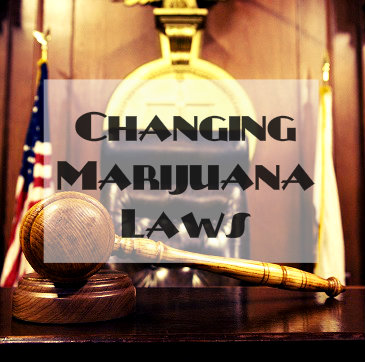 Society’s attitudes toward marijuana have been changing for decades. Some municipalities decriminalized the possession of small amounts of marijuana long ago. In these cities, users may get ticketed, but fines and other repercussions are minimal. In 1996, California became the first state to pass and enact legislation for the legalization of medical cannabis. This allowed doctors to prescribe marijuana to patients who might see benefits from using it.
Society’s attitudes toward marijuana have been changing for decades. Some municipalities decriminalized the possession of small amounts of marijuana long ago. In these cities, users may get ticketed, but fines and other repercussions are minimal. In 1996, California became the first state to pass and enact legislation for the legalization of medical cannabis. This allowed doctors to prescribe marijuana to patients who might see benefits from using it.
After debating the pros and cons of legalizing cannabis, 20 states, as well as the District of Columbia, now allow the legal use of medical marijuana. More recently, residents in the states of Washington and Colorado voted to expand the legality of cannabis and recreational use is now allowed. Alaska may be the next state to pass such legislation. Enough signatures have been collected there to get the issue on the ballot this summer. While states continue to make policy changes regarding marijuana, it is important to remember that this is still an illegal drug, for any type of use, according to the federal government.
What Are The Cons Of Legalizing Marijuana?
Perhaps the biggest reason that states have agreed with their voters and have decided to start legalizing marijuana is for the revenue. As state and local budgets suffer, taxes collected from selling marijuana could make a big difference. There are downsides too, which states and local governments need to consider. The most obvious negative impact could be public health. Marijuana is a mind-altering substance that is most often smoked and could contribute to cancer and lung disorders.
Cannabis is a drug with psychoactive properties. It renders users relaxed and happy, but can also cause paranoia, delusions, and, as a result, some risky behaviors. It impairs judgment and can cause the user to make bad choices and can lead to self-harm and accidents. Just how damaging users under the influence may be remains to be seen. Driving while high on legal marijuana could be a huge issue for public safety.
Among all the negatives of legalizing marijuana, some critics are most concerned about how the policy changes could affect young people. Alcohol has long been legal, but controlled and age-restricted, and yet the harm that it has caused to teens has been dramatic. Underage drinking kills many people every year. Critics of legalized cannabis worry that marijuana will get into the hands of kids and teens more often now and that the impact could be severe. As policies and attitudes regarding this drug shift across the country, it is our responsibility as citizens to be informed.

Every day in the U.S., 105 people die as a result of drug overdoses. Both prescription medications and illicit drugs are to blame, but regardless of the cause, taking steps to reduce the number of unnecessary deaths should be a priority for lawmakers across the country.
One common legal approach to the problem is a “Good Samaritan” law, which promises legal immunity for those who notify authorities of a drug overdose in progress.
Louisiana, despite recently passing a fairly extreme sentence for repeat heroin dealers, has become the 20th state to adopt such a law, and has thereby taken a decisive step in reducing the suffering caused by drug abuse.
Louisiana’s Good Samaritan Law
There were a few changes made to the new rules at the last minute. One of these was that the individual who calls for help will have to stay in the location, and must provide his or her full name to officials upon request.
Paramedics are also allowed to carry naloxone, an antidote to opiate overdose with the potential to save lives all around the country if made widely available.
Furthermore, in a reasonable caveat to the new rule, you can’t be granted immunity if you’re the person who administered the drug that led to the problem.
Although this restriction may still lead to people not calling for help if they’re at fault, it’s clear that people who administer dangerous doses of drugs in unknown circumstances should not be granted immunity without a thorough investigation of the circumstances.
Reporting OD’s And Fear Of Police Involvement
“Research shows that the most common [reason] people cite for not calling 911 is fear of police involvement,” said Louisiana Sen. Sharon Weston Broome. This goes to the heart of the problem the Good Samaritan law was designed to address: these people need urgent care, but the fear of legal consequences delays or even prevents people on the scene from calling 911. In this sense, the law makes it clear that the priority is saving lives, and should drastically increase the proportion of cases where paramedics are able to get on the scene in time.
Louisiana’s Less-Than-Progressive Drug Laws
It’s hard to see an issue with Good Samaritan laws, as long as you’re of the opinion that people struggling with addiction don’t deserve to die because of potential legal consequences, but not all of Louisiana’s rules are underpinned by this forward-thinking philosophy. A perfect example of the more extreme laws is one passed earlier in May that set the maximum sentence for repeat heroin dealers at 99 years. The original bill called only for doubling of the penalties from five years to 10, and critics of the new law have pointed out that murderers and rapists will be in jail for less time than someone caught dealing heroin twice.
The Good Samaritan law is a step in the right direction, but after taking such a monumental step backward with the punishment for heroin dealers, it’s hard to feel as though things are really getting better in Louisiana.
Drug Laws Should Always Focus On Saving Lives
The Good Samaritan law is an excellent example of the sort of drug laws we need. At its heart, it’s about saving lives. Much of the criticism of the ongoing war on drugs revolves around its focus on punishment rather than on providing help for those in need, and for the country as a whole, the increased number of Good Samaritan laws is an undeniably positive thing.
Recently, Georgia passed a similar version of the law, and it seems inevitable that more states will follow.
The Fix’s coverage of the story includes a poignant quote from Kathy Fletcher, a woman who accidently overdosed on prescription medication: “Naloxone saved my life. It should be available to the average citizen just like the EpiPen and glucagon because it’s just as safe, and the faster we get it to people, the more [lives] we save.”
Critics of naloxone and Good Samaritan laws in general may feel as though they’re a tacit approval of drug use, as if the law were saying, “it’s OK if you’re a drug user too, we’ll ignore it if somebody is in danger” or “don’t worry if you overdose, we’re making the cure more widely available so you can survive to nearly OD again.”
This is an oversimplified, easily refutable version of the actual reason for these types of rules.
The complex issue of addiction means that we can’t just lay the blame on the drug users, punish anybody trying to save their lives, and restrict access to a potentially life-saving medication.
Because people are trapped in the cycle of addiction, unable to break free no matter how hard they try, we can’t treat them like social pariahs when they’re more in need of help than ever before. We need to swallow our moral indignation and focus on helping thosein need.
Read Our Other Addiction News Posts
06 Jun 2014
Online Drug Trafficking Becoming Alarming
A recent survey found that there has been an increase in drugs being sold on the Internet, and the results indicate a rise in global drug use in general.
According to the Global Drugs Survey, 60 percent of respondents reported buying illegal drugs like marijuana and LSD online.
Main Reasons For Online Drug Trafficking Increase
 What’s causing this increase in online drug trafficking? The main reason is sites that allow people to anonymously buy drugs using bitcoin peer-to-peer digital currency. The most famous online drug source was the original Silk Road online market, which was shut down by the Federal Bureau of Investigations in October, 2013. Drug officials also report the increase of online trafficking is because users often face the chance of being robbed or physically assaulted during face-to-face drug exchanges, so they feel that online transactions are safer.
What’s causing this increase in online drug trafficking? The main reason is sites that allow people to anonymously buy drugs using bitcoin peer-to-peer digital currency. The most famous online drug source was the original Silk Road online market, which was shut down by the Federal Bureau of Investigations in October, 2013. Drug officials also report the increase of online trafficking is because users often face the chance of being robbed or physically assaulted during face-to-face drug exchanges, so they feel that online transactions are safer.
Respondents to the Global Drug Survey reported that, just like overall Internet shopping, buying drugs online is faster, cheaper and there is a larger selection. The survey found that over 40 percent of participants said they were buying online for the first time, which proves that the web is a growing resource for drug users.
The overall cause of the increase in online drug purchases can be explained by the increase in drug use overall. The survey found that a third of the respondents between the ages of 18 and 24 used drugs, which had increased from a previous survey showing only a fifth of that amount. The Global Drug Survey collected data from 45 countries and 80,000 individuals.
Marijuana is the drug of choice in many countries. Brazil, France and the United States are countries with the highest rate of marijuana consumption. The survey found that 70 percent of Brazilian and American respondents used marijuana.
Another cause for the increase in global drug use can also be blamed on the legalization of marijuana. Countries around the world seem to have conflicting opinions on legalization. The United Nations reportedly feels that legalization poses a great danger to its country. However, Uruguay legalized the drug’s sale and production last year. In the United States, Colorado and Washington State were the first states to legalize the use of the drug recreationally, though with many limitations. In the Netherlands, possession of marijuana under five grams has been legal since 1976.
Something alarming that the survey found that was only about 20 percent of those 80,000 respondents reported ever seeking help or having feelings that marijuana use had a negative effect on their job or schooling.
Read More About How The War On Drugs Isn’t Effective At Protecting Youth


